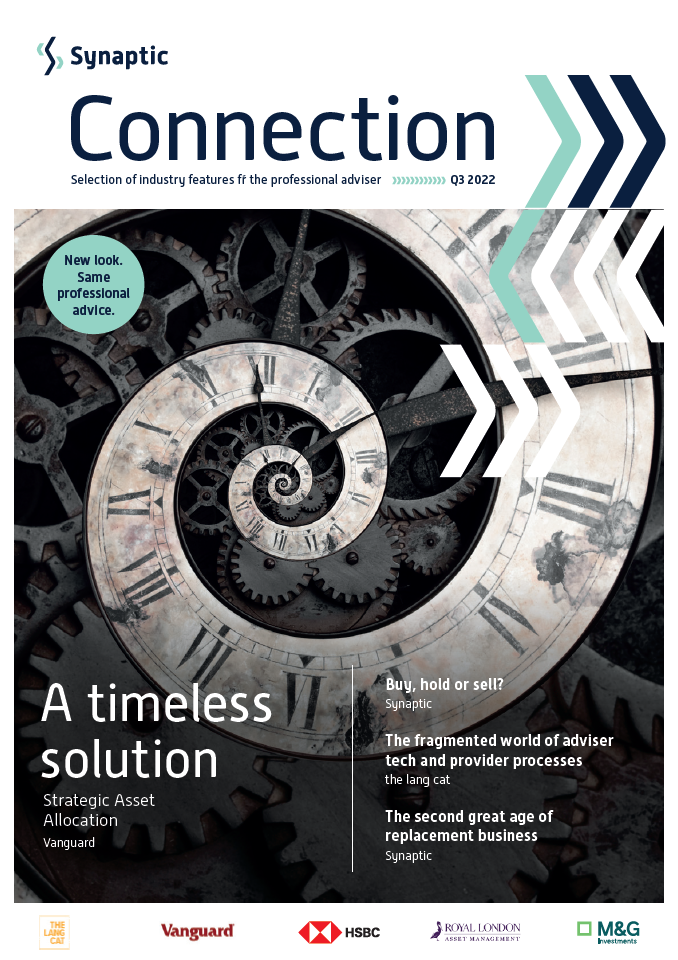In this edition...
- Strategic Asset Allocation: A timeless solution Vanguard,
- The second great age of replacement business Eric Armstrong, Client Director - Synaptic
- The fragmented world of adviser tech and provider processes Natalie Holt, Content Editor - the lang cat
- Will the Consumer Duty make your CIP obsolete Antony Champion, Head of Intermediaries - Brewin Dolphin
- Einstein, Benjamin Graham and Napoleon David Macfarlane, Team Head, Discretionary Wealth Management - HSBC Asset Management
- How IFAs can unlock a smooth ride Marc O’Sullivan, Head of Investments - Wesleyan
- Reliance on others Tim Cooper, Freelance Journalist on behalf of EBI
- Boom-bust economics is back! Be warned… John Pattullo, Co-Head of Strategic Fixed Income - Janus Henderson Investors
- Through a glass, darkly Guy Monson, Senior Partner and Chief Market Strategist - Sarasin & Partners
- Diversified income fund and impact Close Brothers , Asset Management
- Sustainable futures Mike Fox, Head of Sustainable Investments - Royal London Asset Management
- Morningstar Wealth Platform: now the real work gets underway Mark Sanderson, Director - Morningstar Wealth Platform
- A new capitalism Seeking value in Japanese equities M&G Investments,
- Is it the end of an era for the UK property market Andrew Robinson, Senior Investment Analyst - RSMR
- Buy, hold or sell? Either way, you need research to evidence your decision John Warby, Business Development Manager - Synaptic
 Mike Fox, Head of Sustainable Investments at Royal London Asset Management, considers how the challenging economic and market conditions have impacted sustainable funds in 2022, while remaining optimistic about the long-term potential for sustainable investing.
Mike Fox, Head of Sustainable Investments at Royal London Asset Management, considers how the challenging economic and market conditions have impacted sustainable funds in 2022, while remaining optimistic about the long-term potential for sustainable investing.
So far, 2022 has been a difficult year for sustainable investors. Sustained high inflation, which had built up following the reopening of the global economy after Covid-19, put sharp upward pressure on interest rates; and the subsequent Russian invasion of Ukraine and retaliatory sanctions pushed up the price of oil and gas and other commodities still further. As a result, central banks have raised interest rates faster than expected, leading to market conditions that are diametrically opposed to how sustainable funds invest and where we think long-term value will be created.
Our sustainable equity funds embed a long-duration, low-carbon strategy and are not immune to such extreme sectoral performance. The majority of their underperformance against the wider market has been due to the derating of longer-duration growth stocks, with the bulk of the remainder from the repricing of commodities and carbon following the invasion of Ukraine. By their nature, sustainable funds tend to have relatively high allocations to long-duration, growth companies – many of which are found in the technology and healthcare sectors and offer longer-term solutions to the world’s sustainability challenges.
Other than the unavoidable impact of sector weightings, however, our funds have performed well in a particularly difficult environment and outperformed many of their sustainable peers. We have so far seen few problems with the individual companies we own, which are well-established and profitable businesses.
Is the worst over?
There is considerable uncertainty about the outlook for the rest of 2022 and 2023. We believe that we’re in the middle of a two-legged bear market. The first leg, led by an interest rate-induced derating, is largely over unless inflation is out of control on a longer-term view. The second leg, led by a recession and earnings downgrades, began in June.
This type of bear market is very unusual. Usually into a recession, interest rates are falling, so decreasing profit expectations are offset by falling interest rates, which helps the future value of profits via lower discount rates – one offsets the other. Equally, rising rates are usually at a time of strong economic growth so the negative valuation effect of rising discount rates is offset by rising corporate profits. The removal of this inverse relationship between interest rates and profit cycles is the key reason why equity markets and other classes have been weak; it is hard to make money at a time of rising interest rates and falling profitability.
How long could this second, earnings-led, bear market go on for? We have no privileged insight to the future, but bear markets come and go – this is a feature of investing. Expecting them beforehand helps you to invest in a way that makes them manageable when they come. Although we can’t predict the end of this bear market, we can see the opportunity in it, which for us is to own some great businesses at lower prices than we would have been able to do so otherwise.
There may be periods of volatility ahead, but long-term returns are improved by buying at times of uncertainty. Should higher interest rates tip economies into recession, our equity portfolios should be relatively resilient as we favour high return on equity, unlevered larger-cap companies with good pricing power and strong earnings growth. We tend to eschew (for sustainable and/or financial reasons) stocks with more cyclical exposure to the global economy, such as non-core cyclical manufacturing.
"We have no privileged insight to the future, but bear markets come and go – this is a feature of investing. Expecting them beforehand helps you to invest in a way that makes them manageable when they come. Although we can’t predict the end of this bear market, we can see the opportunity in it, which for us is to own some great businesses at lower prices than we would have been able to do so otherwise."
Taking a longer view
We have rarely had so much clarity and visibility into the long-term sustainability-aligned drivers of the companies in which we invest. Many have emerged from the pandemic stronger than ever and, despite challenging stock market conditions, reported good results.
We believe this background and the strong long-term returns, both financial and societal, that sustainable strategies can point to mean that sustainable funds are worthy of consideration by all investors.
We launched our sustainable range over 30 years ago and our investment philosophy has evolved ever since. However, it has always been based on the fact that we think markets often undervalue companies that can have a positive influence on society and the environment. We aim to exploit this inefficiency, ensuring that every company we buy clears both a sustainable and financial hurdle.
Growing our sustainable fund range
We look to work with advisers – to talk through why a sustainable approach doesn’t necessarily mean compromising on returns, but also to make sure that it can meet the varied needs of their clients. Client demand meant that we launched global equivalents of our UK sustainable equity and credit strategies in the past 18 months.
In May 2022, we also launched the RL Sustainable Growth Fund. This fund is based entirely on existing proven capabilities: it has the same underlying global equity and sterling credit exposure as our existing RL Sustainable World fund, but with a lower equity exposure to meet the needs of investors with a lower risk appetite. With the fund rated risk level 6 under Defaqto and Dynamic Planner risk models, it complements our existing multi-asset sustainable funds – so investors can find the risk profile that suits them, but with the same underlying investment philosophy and team.
This brings us back to the core of sustainable investing – identifying financially sound and socially beneficial companies, valuing them and timing our investment to maximise the returns to clients. Sustainability is booming and the pandemic and its aftermath have accelerated its agenda across governments, businesses and consumers. This should help us to find successful investments in the future.
Past performance is not a guide to future performance. The value of investments and the income from them may go down as well as up and is not guaranteed. Investors may not get back the amount invested.
Get in touch
Royal London Asset Management
020 7506 6500
Important Information:
For professional clients only, not suitable for retail clients.
This is a financial promotion and is not investment advice. The views expressed are those of the author at the date of publication, which are subject to change, and is not investment advice. Telephone calls may be recorded. For further information please see the Privacy policy at www.rlam.com
The Royal London Sustainable Growth Fund is a sub-fund of Royal London Equity Funds ICVC, an open ended investment company with variable capital with segregated liability between sub-funds, incorporated in England and Wales under registered number IC000807. The Authorised Corporate Director (ACD) is Royal London Unit Trust Managers Limited, authorised and regulated by the Financial Conduct Authority, with firm reference number 144037.
For more information on the funds or trusts or the risks of investing, please refer to the Prospectus or Key Investor Information Document (KIID), available via the relevant Fund Information page on www.rlam.com
Issued in August 2022 by Royal London Asset Management Limited, 55 Gracechurch Street, London, EC3V 0RL. Authorised and regulated by the Financial Conduct Authority, firm reference number 141665. A subsidiary of The Royal London Mutual Insurance Society Limited.
Sign up for updates
Keep up to speed with everything you need to know each quarter, by email or post.


